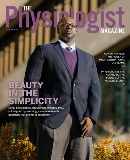Policy IQ
2023 in Review: How APS Advocated on Behalf of Physiologists
Last year was busy for APS’s two policy-focused committees. Members of the Science Policy Committee (SPC) handle a broad range of issues that affect how physiologists do their work, including federal research funding policies on peer review of grant applications, and research security requirements. Members of the Animal Care and Experimentation (ACE) Committee focus on animal research regulations and guidelines. Here are the most significant policy and advocacy activities from APS in 2023, with a glimpse of what’s in store for 2024.
Advising and Advocating
In 2023, APS responded to requests for input from the National Institutes of Health’s (NIH) Center for Scientific Review on two critical topics: proposed changes to the peer review criteria for evaluation of research project grants and requested feedback on how applications for National Research Service Awards are reviewed and scored.
APS also provided input on re-envisioning U.S. postdoctoral research training and careers and new research security requirements for institutions that receive federal research dollars. These issues affect APS members at every career stage, from trainee to established faculty. Review the full text of APS policy responses.
Academic researchers depend on robust funding of federal research agencies to support research and training. Each year APS joins other advocacy organizations to set research funding targets for Congress for NIH, National Science Foundation, Department of Veterans Affairs and NASA. SPC members, APS Early Career Advocacy Fellows and APS leaders participated in more than 50 meetings with congressional offices to make the case for research funding in 2023. Using the APS Action Alerts system, more than 200 messages were sent to members of Congress throughout the year in support of funding for biomedical research.
Supporting Animal Research
Because physiology research often relies on ani mal models, APS is a strong advocate for responsible and humane use of research animals. APS also advocates for reducing the administrative burden of complying with the federal agency requirements and regulations in ways that do not compromise animal care. The NIH Office of Laboratory Animal Welfare (OLAW) oversees requirements for researchers with NIH funding, including the function of Institutional Animal Care and Use Committees (IACUCs).
Following obligations from the 21st Century Cures Act to reduce regulatory burden, OLAW issued several requests for input. APS advised the agency on several policies related to IACUC review, the OLAW disclaimer statement that describes the role of the office’s policies and proposed new guidance on the use of cephalopods in research.
As NIH sought to bring attention to the role of novel alternative methods, APS provided input on how these technologies can be used by academic researchers to complement existing methods, while acknowledging the current limitations of these methods for use in basic research. This promises to be an active area of interest for research funders seeking to advance technologies that do not involve the use of animals.
Collaborating With the National Academies
Continuing a collaboration started in 2022, on March 10, 2023, APS members provided input to the National Academies of Sciences, Engineering and Medicine’s Standing Committee on the Guide for the Care and Use of Laboratory Animals during a three-hour listening session. The Standing Committee continues to work on initiating a long overdue revision of the Guide, and as a sponsor of the committee’s work, APS is focused on providing the perspective of working scientists.
Looking Ahead to 2024
APS would like to see more physiologists participating in policy and advocacy activities. To help members get started, the SPC is designing a new online course for physiologists who want to learn more about being involved in advocacy for science. Keep an eye out for the course to launch in the first half of 2024.
Headed to the American Physiology Summit in Long Beach, California, this April? Be sure to arrive in time for pre-conference sessions on Thursday afternoon. The SPC is presenting a can’t-miss session on how scientists can get started in advocacy (and why they should) at 12 p.m. on Thursday, April 4.
In February, the ACE Committee will hold a series of meetings with congressional offices to talk about why animal research is important and how Congress can better support scientists. Meeting early in the year provides an opportunity to have these conversations right before the Appropriations Committees begin working on annual funding bills, where problematic restrictions on funding for research with animals often appear.
This article was originally published in the January 2024 issue of The Physiologist Magazine. Copyright © 2024 by the American Physiological Society.
The Physiologist Magazine
Read the Latest Issue
Don’t miss out on the latest topics in science and research.
View the Issue Archive
Catch up on all the issues of The Physiologist Magazine.
Contact Us
For questions, comments or to share your story ideas, email us or call 301.634.7314.


